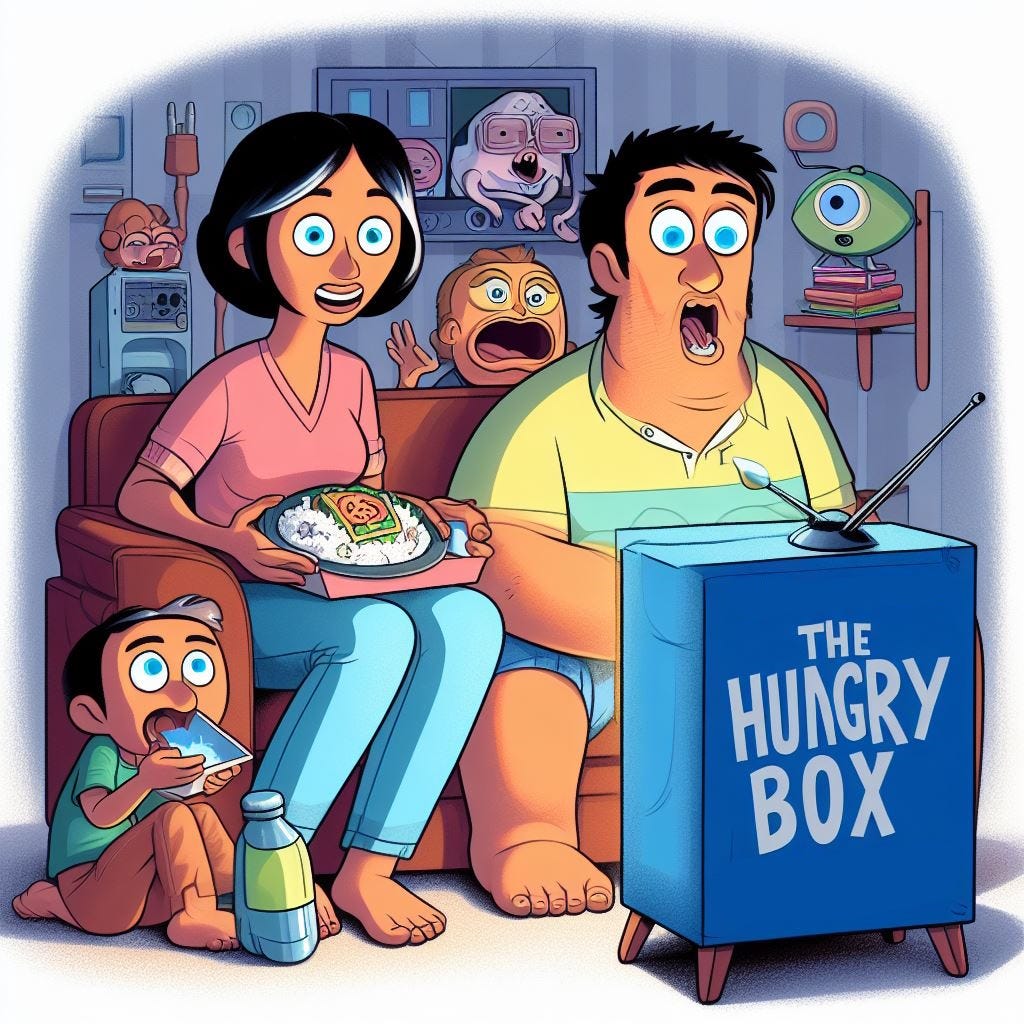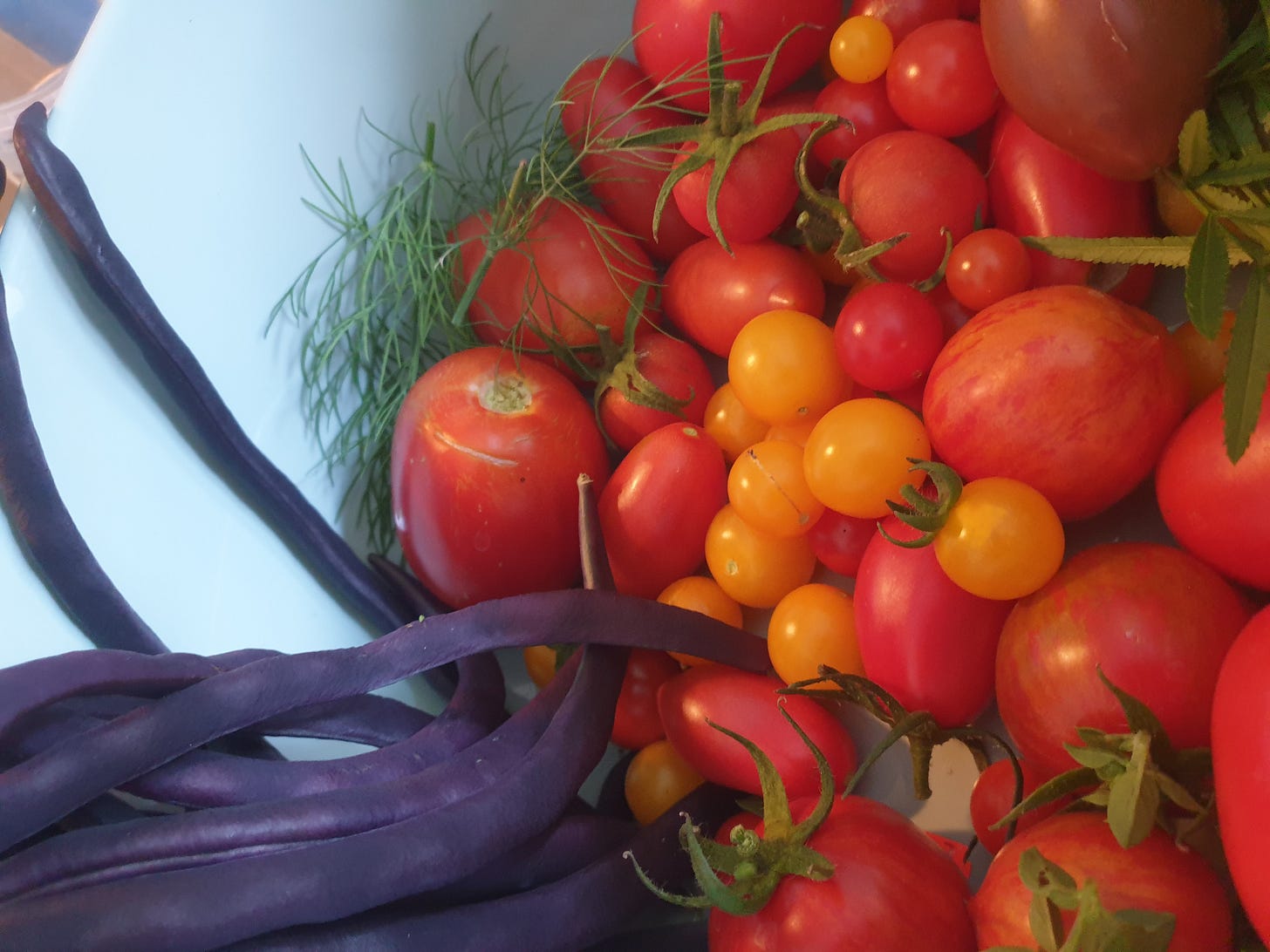Reclaiming Mealtimes – the Lost Artform of Appreciating our Food.
Battling distraction and reclaiming consumption.
Have you ever found yourself watching videos, scrolling social media, or even playing video games whist eating? Perhaps it could be listening to something, reading a book or cereal box, or even worry, intensive thoughts, anxiety, and of course, ‘work’.
These are all a distractions from the act of consuming our food. In fact, we often go to great lengths to distract ourselves from the ‘boredom’ of eating and come up with mind manufactured justifications for this behaviour.
As a teenager I was ‘told off’ by a cousin who did not like walking and eating. He would want to sit and eat, I held no appreciation for this, thinking him old fashioned. Now I realise he had a point.
We are chronically distracted humans. Distractions today are unrivalled throughout history. In the challenge to ‘keep up’, our attention has been wrangled and twisted, manipulated and turned into a highly prized commodity. However, it is still one of the superpowers we retain when we choose to use it – our conscious attention.
Our attention is being pulled away from us in all directions, and most importantly, it is being pulled away from the facets of life that make us uniquely human. For example, our conscious appreciation of food.
Why are we in human form anyway? For all we know this might be the reason we came here in the first place – to experience ‘humanness’. And consumption (however bad press this words gets today) is a critical and unavoidable part of this experience. Can we take consumption back?
Can we reclaim our attention at meal times? Can we go further and even reclaim the much demonised act of ‘consumption’ itself? This might be a bit of a big mouthful for this post, a case of biting off more than I can chew, and while there are many neurosis around the act of consumption, the issue what I want to focus on here is that of distracted eating.
Battling Distraction
Today, I prepared my breakfast, sat down, and promptly ignored it, choosing instead to look at my screen again, mouse meandering around myriad options – What to consume with my consumption?
Why? Why not just focus on the beautiful bowl of fruit, nuts and other fresh goodies? A meal fit for a king should not be a sideshow, or thought of as mere ‘fuel’. No, this stuff is going to become me, it is going to be integrated into my body. That sounds kind of profound right? Something worth a little attention and contemplation perhaps?
So why do we reach for the distraction right away? Why have we become bored with our eating? We have more food options than ever, and quality can be found if sought out. It seems that in reclaiming our meal times, we have to make a conscious effort to pay attention to the food in front of us. This requires the intention to do so, and the application of attention on the act itself. What are we actually doing when we consume food? We are breaking it down, and integrating it – we are taking part in the cycle of life on earth here. There is something undeniably profound happening here, something that has been reduced to the mundane, and therefore, deemed ‘boring’.
But this boredom can be our access point – our route into a deeper appreciation of what we are. Every meal time should be a celebration, a giving of thanks to the forces that have conspired to get us here, and to the sacrifices that have been made so that we may go on.
Ways to help ourselves out of distraction at meal time:
Giving thanks.
Beginning the meal with a simple statement of gratitude does wonders for the conscious realisation of consumption. Make up your own words – say what you feel comfortable with. This kind of statement acts as a marker, the ‘beginning’ of the feast. But we shall not eat until we have said thank you. This pause before eating gives us time to reflect upon the action.
Conscious appreciation of food.
Saying things out loud (yes even if you are alone) is a way to reflect upon and feel them more deeply. Let yourself make bold statements about the flavours and textures you are experiencing. Smack your lips, savour with conscious appreciation.
Inviting others.
This is one that we don’t all have the option for, and the intention of this writing is really to apply to the lonely individual who is certainly the target for distracted eating. However, eating with others means you will engage with them, around the food, discuss the food, and have real conversations. This is much better than being a voyeur on someone else’s discussion.
Taking time to prepare wonderful food.
Don’t get me wrong – I never make lasagne. If it can be called a ‘faf’ then I probably won’t be making it. However, when I cook, I put full effort into the things I produce. Gone are the days of oven pizza, microwave rice and pre-cut veggies, or the dreaded ‘ready-meals’. My food is made from scratch (with a few wonderful secret hacks I have) with raw, fresh, hopefully high quality ingredients. Effort is put into the shape, colour, texture and taste of the meal. Everything I cook is an experiment, it is fun, it is art.
Eating meditation and contemplations.
Some I’ve seen are: These animals and plants are integrating into me thus ascending and transmuting to a higher plane of existence, accelerating their spiritual journey (not sure about this one, but whatever floats your boat). Another is pondering the sacrifices made so we can eat and continue on, and to remembering and honouring all past sacrifice that brought us here, perhaps imagining your ancestors living through you in this very moment – every mouthful you taste, they taste too, and if you don’t honour this, they won’t get to share in the bounty of their foundation.
Sit down at the table.
I began this essay with a story about my roving youth, and yes, walking and eating has a function in times of difficult work and travel. However, when you snack stood up in the kitchen, or taking items on a plate to recline in front of a screen, does your body really know what’s up?
It is reminiscent of a buffet party, again stood up, where we fill our plates with novelty item after novelty item, never being satiated. This is because there are no recognisable boundaries to the meal time – no start and no ending. This is confusing and the lack of boundaries leads to not knowing what or how much we have eaten (or drunken as one usually gets in this situation).
Ditch Snacking.
Snacking eats into the appreciation of meal times, and has the same issues presented in the last point – snacking food is usually junk, and we don’t register how much of it we have eaten when we consume in a mindless or casual way.
Get Hungry.
Fasting, either for long periods or intermittently is a great way to really feel your appetite. Modern man is so chronically and habitually stuffed with food that he may not remember what it feels like to be really, authentically, hungry. This can be a profound state of being, where ones senses are literally enhanced in order to locate food. The scent of onions frying in butter after a 24 hour fast is heavenly. There is nothing so restorative as a hot, hearty meal to an hungry man.
Benefits of mindful conscious eating.
The benefits are so numerous they are hard to list: Eating less and feeling fuller, appreciating our connection to nature and place in the agricultural cycle, acknowledging the bounty in our lives with gratitude: all powerful and positive reflections on the act of consumption. We also grow our attention muscle, which can be then flexed in other arenas.
But you could just ignore this and ignore your food.
And carry on being distracted while you eat. Perhaps you are eating right now. What will you gain? You will fill yourself with more of the same – the same stuff you were doing when you were not eating. Did you really need that extra video or article? Did you really need to level up whilst eating pizza? We are led to believe that next little mouthful of information is going to be the one that enlightens us – but this is a trick. It only further bloats us and makes us sluggish and over-saturated.
Distracted eating encourages mindless and thus extreme forms of consumption. Whichever way this goes, our consumption habits are not our own anymore, and it leads to disorder. More importantly it leads us away from and diminishes those most important aspects of humanness and the human experience.







Great topic!! Thanks for this...